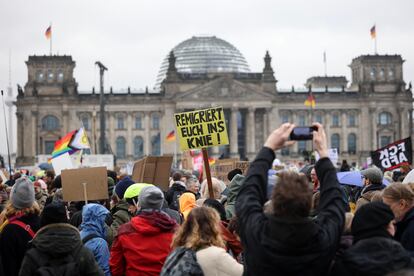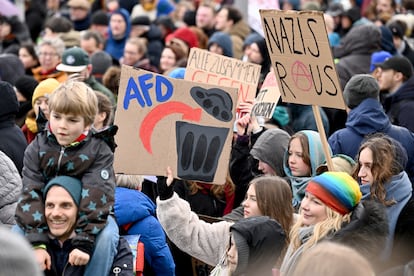Thousands surround the German Parliament against the far right: “We are the firewall”
Several cities hold demonstrations against a project of mass deportations of immigrants discussed by AfD members with a group of neo-Nazis

Thousands of people took to the streets this Saturday in Berlin and other German cities to express their rejection of the far-right and alleged plans for mass deportations of migrants. Under the slogan “We are the firewall,” demonstrators in the German capital, which has become the epicenter of all the marches, have surrounded the Parliament as a symbolic firewall against extremists. “It is our responsibility as civil society to defend solidarity and coexistence,” explained members of the Hand in Hand alliance, which is behind Saturday’s call, signed by more than 1,800 organizations and other civil society initiatives. Although at first it was planned to make a human chain around the Reichstag, the large influx of people — at least 150,000 participants, according to the police — turned the circle into a large mass around the emblematic building that houses the Parliament.
At the same time, more than 100 demonstrations for democracy and against the far right were organized in other cities, from Schleswig-Holstein in the north to Bavaria in the south, with some of them being large, such as the one in Dresden.
The marches follow those held in recent weeks after the investigative portal Correctiv uncovered a secret meeting organized in late November at a Potsdam hotel between leading members of the far-right Alternative for Germany (AfD) party and known neo-Nazis. Their aim was to draw up a “master plan” to deport millions of people of migrant descent, including citizens with German passports but supposedly “non-integrated”. Although AfD, which is booming and already second in voting intentions at the federal level, has denied that these migration plans are party policy, the protests continue.
The news of this secret meeting was the trigger that moved part of society. “They are really very different people,” explains political scientist Simon Franzmann, a researcher at the German University of Göttingen. “Now there is also what is known as the center, as well as small and medium-sized entrepreneurs, who are rather conservative.”
Thus, the wave of protests brings together not only people traditionally on the left, but also people from the center-right, who “are perhaps skeptical about immigration, but who are not enemies of the system and who want to make it clear that what the ultra-right is doing is not what they want”.
Erwin Häringer is one of hundreds of thousands of demonstrators. For the 78-year-old Bavarian doctor and teacher, father of two daughters, it is about making it clear to the extremists that “Germany has a heterogeneous and diverse population.” “We want to ensure that human rights are never again violated in Germany. It is important that we say never again and never again is now. We have to be vigilant, defend democracy and defend the heterogeneity of the population,” he says.
“It has been forgotten that Hitler came to power because democracy reacted too late or not at all. They simply let him do it,” he recalls about a historical fact that is very much in the spotlight these days, since January 30, 1933 was the day Adolf Hitler was appointed chancellor of Germany.
Erwin Häringer took part in the protest on January 21 in Munich. “What I saw at this demonstration, and I have been to many, was a cross-section of all classes.” People who like him are concerned about the possibility of “anti-democratic forces becoming ever stronger.”
Mareike Godolt, a school teacher in Berlin, who attended the last demonstration in Berlin before this Saturday’s, sees it the same way. “It’s scary to see how strong a party like AfD is becoming,” she declares of her motives. “It’s important to show that we are here too and that we don’t share their ideas, that many people think differently.”
For this 43-year-old woman born in West Berlin, the plans to deport migrants are “frightening” because they point to something she had hoped was long behind her. It is something she saw already in the 1990s, after the fall of the Berlin Wall, a “very, very complicated” time, where in some areas like “in the east of the city or in Brandenburg there were a lot of Nazis,” she recalls.
“I live in Berlin, where we are a mixture of origins, where everyone is a Berliner and we all belong here. For me it is an important part of my identity that we can live together like this in Berlin,” explains the career physicist turned teacher.
Her circle of friends is multicultural, as is the school where she works. “The children come to me in fear and ask me if they are going to have to leave the country and what is going to happen now,” she points out. “It’s about showing them that we are more and that we want them to stay because they belong in the country as much as anyone else and not to be afraid.”

Protests are also taking place in Saxony, one of the AfD’s strongholds and where, according to the latest polls, it is expected to win 35% of the votes in the September elections. The proximity of the elections prompted citizens like Matthias Wolf to attend the massive demonstration last weekend in Leipzig.
“There are many reasons to go. One of them is that there are [regional] elections in September and people have to realize that the stakes are high. It’s possible that AfD could be the party with the most votes and enter the government, which is something we have to avoid,” says the math teacher at a Leipzig high school.
For the 42-year-old German, who is passionate about traveling the world and table tennis, it is important to show that there is a large majority in favor of democracy and freedom. Unlike many other people, he would have come out earlier to demonstrate, but he is aware that for many the trigger was the secret meeting in Potsdam revealed by Correctiv.
“It was the straw that broke the camel’s back and openly showed how racist and nationalistic this party is and that it’s time to do something against it,” he declares. “For me it was not a surprise.”
With European elections coming up on June 9 and those in the Länder of Saxony, Thuringia and Brandenburg in September, the question on many people’s minds is to what extent this citizens’ movement will have an effect at the ballot box.
Although “it is a kind of ray of hope that democratic debate is being sought,” political scientist Franzmann does not believe that these types of protests will continue for long, although they open an interesting conversation among the population. “There are many people who are somehow in the middle, who do not have a defined ideology and who are now reflecting on whether it is necessary to send a signal.”
It is on these people, who are not consistent in their voting, that the protests can have an effect, the expert believes. These are people who at one time were close to the AfD and now “are distancing themselves again and will probably not support it again,” he explains.
Aware of this, AfD “has moderated the language it uses, they have learned that certain terms cannot be used in public and they will be more careful in their communication strategy, although I don’t think they will change their content,” stresses Franzmann.
Nevertheless, AfD will continue to have a large following. “It must be clear that in Germany we will have to coexist for a long time with right-wing populist parties with far-right elements,” he adds. Statements that are in line with the latest poll by the German public broadcaster ARD, where AfD remains the second force nationwide with 19%, only one percentage point less than in the January survey.
Sign up for our weekly newsletter to get more English-language news coverage from EL PAÍS USA Edition
Tu suscripción se está usando en otro dispositivo
¿Quieres añadir otro usuario a tu suscripción?
Si continúas leyendo en este dispositivo, no se podrá leer en el otro.
FlechaTu suscripción se está usando en otro dispositivo y solo puedes acceder a EL PAÍS desde un dispositivo a la vez.
Si quieres compartir tu cuenta, cambia tu suscripción a la modalidad Premium, así podrás añadir otro usuario. Cada uno accederá con su propia cuenta de email, lo que os permitirá personalizar vuestra experiencia en EL PAÍS.
¿Tienes una suscripción de empresa? Accede aquí para contratar más cuentas.
En el caso de no saber quién está usando tu cuenta, te recomendamos cambiar tu contraseña aquí.
Si decides continuar compartiendo tu cuenta, este mensaje se mostrará en tu dispositivo y en el de la otra persona que está usando tu cuenta de forma indefinida, afectando a tu experiencia de lectura. Puedes consultar aquí los términos y condiciones de la suscripción digital.








































